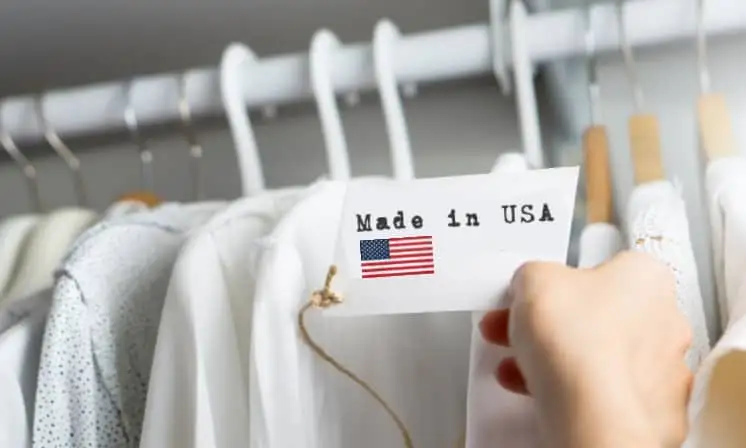The Pros and Cons of American-Made Clothing: Is It Worth the Investment?

For many decades, “Made in the USA” has stood for a particular pride, craftsmanship, and trust. However, as the global fashion scene continues to change, many shoppers may be wondering: Is the American-made clothing truly worth it?
As advocates for brands that keep American manufacturing alive, from small-batch denim to ethical, everyday lifestyle clothing, we at ProdOrigin have decided to explore the question of weighing the pros and cons of apparel produced in the United States.
This way, you can be sure that your next shopping trip will be as value-based and impactful as possible.
The Benefits of American-Made Clothing
1. Higher Quality and Craftsmanship
Factories in the U.S. tend to have smaller runs, stricter quality control, and more precision.
That translates into a higher-quality finished product: natural fibers like selvage denim, organic cotton, or raw wool that will last and age beautifully, meticulous cutting and sewing by expert artisans, and a fit that has been tailored for people (rather than built around bulk production).
Over time, that quality translates to fewer replacements and repurchasing, and more value. You will be investing in a product that will genuinely last and work.
2. Ethical Employment and Fair Wages
Supporting American-made products also means supporting fair wages and safe working conditions. Factories in the United States must comply with regulated working hours and benefits. Labor laws in the U.S. are designed to ensure safe conditions and fair pay, which, unfortunately, cannot always be said about overseas production.
Each American-made purchase is a step toward sustaining ethical work in communities around the nation.
3. Supporting the Local Economy
Buying American-made is excellent for the local economy: each dollar spent goes right back into wages, local suppliers, and small-business owners.
The materials, too, tend to be sourced locally, from cotton in the South, denim in North Carolina, leather in Pennsylvania, and more, multiplying the effect. It’s not just a purchase for you; it’s an investment in your own community.
4. Reduced Environmental Impact
A shorter supply chain means less shipping emissions and better quality control. Due to both cost and convenience factors, many domestic manufacturers are turning to sustainable practices, such as closed water loops, renewable energy sources, solar panels, and smaller-batch production that reduces waste and overproduction.
For the conscious shopper, “Made in the USA” is often synonymous with a lower carbon footprint.
5. Transparency and Trust
Purchasing domestic goods also makes tracing the origins of your clothing much easier. In the U.S., there are stricter regulations on labeling, safety, and environmental impact. You can be more certain about how your clothes are made and who is making them.
When you support American-made brands, transparency is at the core of the relationship between brand and consumer.
The Cons of American-Made Clothing
1. Higher Price Tags
The first and most evident disadvantage is, of course, price. The U.S. is, without a doubt, more expensive to produce in. Fair labor, materials, and domestic small-batch production mean higher costs than fast-fashion retailers can afford.
The exact T-shirt that you can get for $15, produced in Asia, will cost you $40–60 if produced here at home.
On the other hand, those prices almost always reflect better quality and more long-term value, making them more of an investment purchase rather than one you need to replace.
2. Less Variety and Availability
Small-batch American-made brands, by definition, will be producing in smaller quantities and more limited style runs. This can mean having to plan for purchases, or waiting for pre-order restocks. Larger fast-fashion retailers have entire warehouses full of styles that they can churn out immediately, a particular convenience and choice.
3. Limited Scale of Production
For manufacturers, scaling up production with high margins and smaller facilities can also be a con. For consumers, however, it can lead to smaller in-stock availability but a more personalized and custom-feeling buying experience.
4. Misleading “Made in USA” Claims
It’s important to note that not all “Made in USA” labels are created equal. Some brands have tried to skirt the system and sell items that are only partially made in the U.S., or whose “domestic” label is applied only to final assembly. While we at ProdOrigin seek to be as authentic as possible and only feature brands that disclose full sourcing, there are definitely exceptions in the industry.
Is Buying American Clothing Worth It?
In short, for those who prioritize ethics, craftsmanship, and sustainability over convenience and accessibility, American-made clothing is worth the extra money.
It may be more expensive, but the price tag reflects fair wages, higher-quality materials, and smaller-scale manufacturing with a more ethical approach and environmental impact. Conscious shopping is not just about buying clothes; it’s about purchasing with a purpose.
Every domestically made shirt, jacket, or pair of jeans you buy will support real people, local businesses, and the tradition of American manufacturing.
At ProdOrigin, we will continue to feature brands and individuals who value integrity, transparency, and timeless design because fashion made at home is not only worth the extra dollar but also worth protecting.
Frequently Asked Questions
1. Why are American-made clothes more expensive?
Higher costs come from fair labor practices, better-quality materials, and smaller-batch production.
2. Are all American-made clothes sustainable?
Many focus on local production with eco-friendly fabrics and sustainable, low-waste manufacturing, though sustainability standards can vary by brand. Always do your research.
3. How do I know if a product is genuinely made in the USA?
Look for sourcing transparency, not just assembly locations. Check out platforms like ProdOrigin, which highlight and verify American-made products.
4. Do American-made brands offer modern, on-trend styles?
Of course! Minimalist streetwear, tailored workwear, sustainable luxury, and many U.S.-based brands are blending both heritage and modern design.
